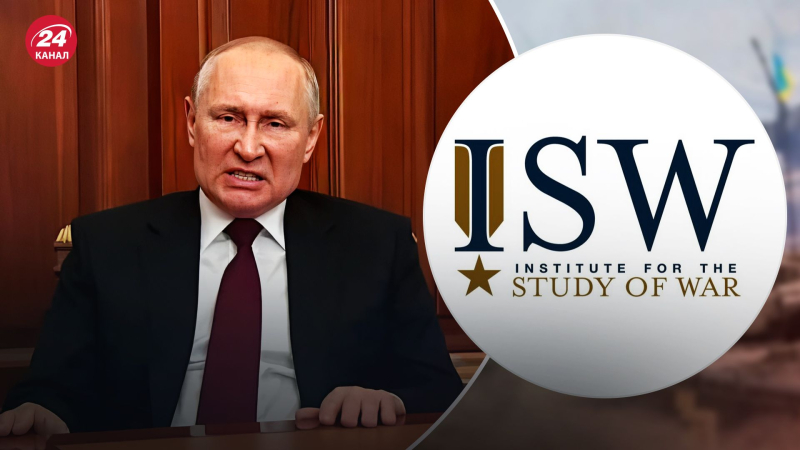Putin's “Victory Theory”: ISW Analysis, Will the Dictator Achieve His Goals Yulia Murina In ISԜ analyzed Putin's “victory” strategy/Collage 24 Kanal (illustrative photos)More interesting audio newsListenListen to this news00:0001:16xAudio synthesized using AI.Listen to this news00:0001:16xAudio synthesized using AI. The Russian dictator's current “victory theory” is aimed at prolonging the war. Putin dreams that the occupiers will be able to “survive” Western support and break the Ukrainian resistance, winning a war of attrition. This was stated by the American Institute for the Study of War. ISW analyzed Putin's so-called “victory theory.” Analysts noted that Putin's “victory theory” in Ukraine is aimed at prolonging the war. It claims that Russian troops “can survive” Western support for Ukraine and “break” Ukrainian resistance, “winning a war of attrition.” However, Russia is likely to face serious medium- and long-term limitations that will undermine these strategic efforts, ISW emphasized. They also noted that Putin and the Russian military command have committed the military to conduct offensive operations along the front lines in the East and Northeast for a year. The goal is to exhaust the Ukrainian Armed Forces and prevent Ukraine from accumulating the necessary manpower and material and technical resources to conduct counter-offensive operations that would call into question Russia's initiative throughout the entire theater of military operations. Putin and the Russian military command likely view maintaining the initiative across the entire theater of military operations as a strategic priority and have demonstrated that they tolerate protracted offensive actions that lead to gradual creeping advances that do not correspond to the intended “operational” goals, the Institute for the Study of War wrote. Analysts noted that the occupiers are now trying to eliminate the challenge to their initiative across the entire theater of military operations in the Kursk region after the start of Operation Defense Forces in August, while maintaining offensive pressure in eastern Ukraine and pursuing long-standing goals. ISW suggested that the intensified offensive operation by the Russian military in the summer of 2024 to capture Pokrovsk would likely “culminate in the coming months.” Although the occupation command would likely continue to commit troops to an overall strategic effort to maintain the initiative across the entire theater and exhaust Ukrainian forces well before that operational culmination, regardless of the state of Russian forces' combat readiness. Putin's “victory” theory is based on the idea that Russian forces will conduct successive offensive operations ad infinitum, but these exhausting assaults will likely degrade the condition of Russian manpower and equipment to such an extent that Russian forces will be forced to slow down the pace of the offensive at least in certain areas of the front, giving Ukrainian forces the opportunity to fight and possibly seize the initiative on the battlefield in these areas, ISW said. They added that medium- and long-term limitations on Russian military potential and military-industrial production will undermine Russia's ability to sustain successive offensive operations aimed at prolonging the war and exhausting Ukraine. By the way, analysts are observing a constant and widespread increase in the financial incentives that the authorities of the aggressor country offer for concluding a military contract with the Ministry of Defense. This indicates that Russia is exhausting its reserves of “volunteers.” Interestingly, Russian authorities have expressed concern that current efforts to recruit volunteers are yielding diminishing results. Putin remains keen to avoid mobilization, despite growing signs of constraints in the formation of the armed forces. Putin retains the option of carrying out another wave of partial mobilization, as he did in the fall of 2022, but will likely do so only under intense pressure or after the current campaign suffers significant failure, ISW believes. Analysts noted that enemy offensives in Ukraine have resulted in significant losses of equipment, especially armored vehicles. Russia's military-industrial capacity is unlikely to be able to replace these losses in the medium to long term. Russia is now relying on the restoration of large but limited stockpiles of Soviet-era equipment to replace the huge losses in Ukraine, and appears to be depleting stockpiles at a rapid pace, the Institute emphasized. They added that the aggressor is using partnerships with North Korea and Iran to acquire ammunition and military equipment, and is also cooperating with China to acquire critical components for defense production. However, according to analysts, these international purchases will not be able to meet all of Russia's needs for material and technical means in the war against Ukraine. “Putin appears to be as reluctant to carry out a full-scale economic mobilization as he is to carry out another wave of mobilization, and it remains unclear whether critical bottlenecks and the worsening labor shortage will allow Russia's economy to be quickly and fully mobilized for military action if Putin allows it,” ISW noted.
ISW on Putin's “victory theory”
ISW on Russia's Enormous Losses and the Possibility of Mobilization
Putin's “Victory Theory”: ISW Analysis, Will the Dictator Achieve His Goals
53

